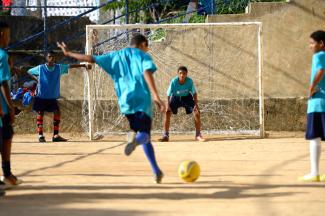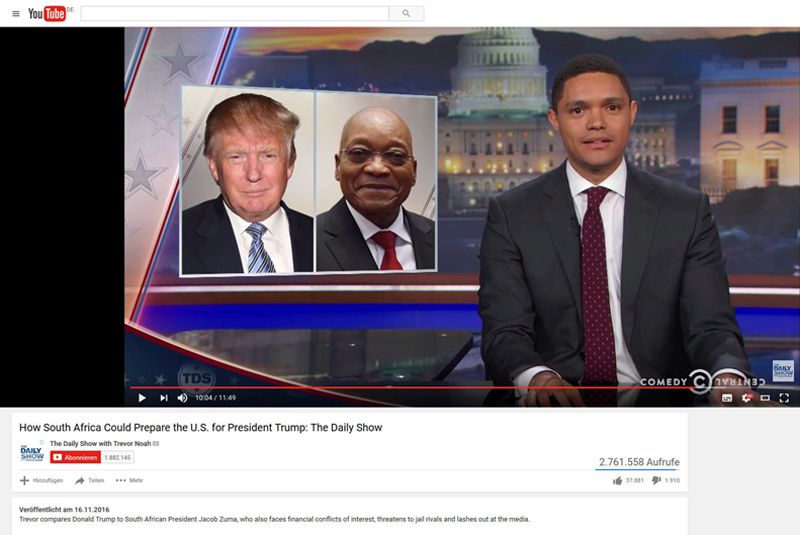International cooperation
“Basic principles of compliance”

Are all sports tainted by corruption?
Yes, they are. No sphere of life is totally free of corruption, and that applies to sports too.
Why has corruption in sports become such a big issue?
It’s because sport is very competitive. People want to succeed by any means, and some resort to doping or manipulation. As the internet emerged, we saw games being fixed to cheat in betting, and that is obviously not acceptable either. If you consider management, moreover, a lot of power, influence and public attention is at stake. Even the president of a third league football club is a respected man in his town. And it goes on, all the way up to assigning hosts for major events like the Olympic Games and the FIFA World Cup. Competition is tremendously fierce. It is about a lot of money and reputation. Accordingly, the risk of corruption rises. Adding to the problems, corruption still pervades the politics and economies of many countries.
Are you suggesting, for example, that there is more corruption in Italian football than in German football?
Yes, though Germany has seen scandals too. There was the case of Robert Hoyzer, a referee in the second tier Bundesliga, or the case of striker René Schnitzler. Many more cases have come to light in Italy’s Serie A and B however. Games were manipulated – either for sporting reasons like avoiding relegations, or for betting reasons.
I’m uncomfortable with this kind of comparison, because we Germans like to think that other countries have huge corruption issues and that things are clean in our country, but that is obviously not accurate.
Yes, Germans must be watchful too. And that is why it is a good thing that dubious payments surrounding the 2006 World Cup are now being looked into.
Uli Hoeness, a football manager who, as a player in the 1970s, used to be part of the national team, was sentenced for tax fraud, but his case doesn’t relate directly to the sport. What can be done against corruption in sports? After all, it is hard to imagine football without foul play.
Thanks for the good cue. There are actually clear rules in football concerning fouls, plus a system to monitor and enforce the rules. The referee punishes the violation of rules, and if he does not do that consistently right from the start of a match, he will be unable to control it. It is the same with corruption actually. We need rules that can be monitored and enforced, with sanctions for those who break them. These are the basic principles of compliance – and they are needed everywhere, not just on the pitch but as well in business and politics.
So who is the referee off the pitch?
You need a complete compliance system, with clear rules and procedures, directives and sanctions. Criminal law does not suffice. Integrity is more than not committing a crime. We need rules on what kind of gifts and invitations are appropriate, how one must behave in situations of conflicts of interest and on disclosure. And there are different risks. In a private-sector company, a secretary who only writes letters will warrant less monitoring than a purchasing manager who deals with many suppliers. In sports, doping might occur in figure skating, but the risk of doping is probably much higher in sports where you need above all power or endurance, like cycling or weight lifting, because in these disciplines the impact of doping on an athlete’s performance is much higher. Doping also becomes more likely in the preparation for an important competition – or after a period of rest due to an injury. These specific risk situations must be taken into account.
Isn’t it more important to fight corruption in other spheres of society than sports?
Of course, one might say that other areas matter more than sports, but since people love sports, flawed behaviour gets noticed by a huge public. This kind of attention helps us to spread our message, especially as sport is supposed to be based on fair play. If people accept the idea that corruption occurs even in sport, is normal, and nothing can be done about it, then we might just as well stop fighting corruption altogether. Successes in the fight against corruption in sports send signals. On the other hand, we must not promise too much. It won’t be possible to clean up sports completely.
Why not?
Because no sphere of life is free of corruption, and because sport is a global undertaking. Associations like the International Federation of Football Associations (FIFA) or the World Swimming Association have members in up to 200 countries. Anyone who is familiar with Transparency’s Corruption Perception Index will know that many of those countries are quite corrupt. Who leads the athletics association there? Probably not one of the few people with integrity, who you fortunately can find in all countries. The top of the national sport federation will usually be reached by officials, however, who know how to prevail in their societies, and then they will play a role in the world association too. It is like in the UN context, where every country is represented, no matter what kind of government it has.
Are you saying that the global sports associations are corrupt because of their members from the countries listed in the lower half of Transparency’s list?
Well, widespread corruption raises the risk. We must bear in mind, however, that corruption always has two sides, the givers and the takers. In the FIFA scandal, the FBI investigations with spectacular arrests in the USA were started because US-based companies had bribed Latin American sport officials for TV rights. By the way, that was not directly linked to FIFA business, but the investigations put pressure on FIFA to come clean and ultimately led to the downfall of Blatter. Joseph Blatter, the former FIFA president, is not from Asia, he is from Switzerland, and Michel Platini, who was expected to become his successor, is not from Africa, but from France. Both have been suspended from FIFA because of dubious payments. Corruption is not limited to specific countries or continents.
Gianni Infantino, the current FIFA president, was mentioned in connection with the Panama papers. Does that mean that things have not changed since Blatter?
One must be careful with accusations of that kind. According to what I have read, there is nothing in the Panama papers that incriminates him. He was the head of the law department of UEFA, the European Football Association, and thus responsible to oversee all contracts. Some contracts were worth hundreds of millions of euros. People who handle that kind of sums do not normally bother about contracts worth 100 000 Euro. That is not their job. Besides, it is pretty obvious that a European association shouldn’t be handling TV rights in a far-away country like Ecuador itself. They need agents who know the place. In this case, a tender or auction was held according to standard procedures. The highest bid won. Infantino cannot be blamed in this context. To fight corruption, we need clear rules and an enforcement system. It is counterproductive to display outrage just because of a suspicion without having looked into the details.
Corruption is a constant issue in international development affairs. Do sports have a bearing in this context?
Well, one should monitor all spheres of life, including funding for sport programmes or sporting events. One must make sure that funds are used correctly, and not for instance by some sports association official’s spouse on a shopping spree.
Assigning host cities for major sports events appears to be especially problematic. Wouldn’t it be smarter to auction the Olympic Games or the World Cup? Then the country that pays most would stage the event, and no bribes would be paid.
Yes, that would be feasible, but there are good reasons why that approach hasn’t been taken. These events are not designed for the richest countries. They are meant to be shared fairly among continents and countries. They are supposed to generate interest in sports and support for sports. When it was decided in 2007 and 2009 that Brazil would host the World Cup and the Olympics, that was generally welcomed, both at the international level and in the country itself. Back then, Brazil’s economy was booming. Moreover, it was plainly South America’s turn. Mexico had previously hosted Olympic Games, but no South American country ever had. Today, Brazil is in economic crisis, and the situation has changed. We should bear in mind, however, that several things were done to improve transparency. Some Brazilian regulations would make German business leaders squirm. Day-to-day corruption is still alive in Brazil, and corruption in politics is a big issue, however, and that is why the current situation has become so explosive.
Sylvia Schenk chairs the working group Corruption in Sport of Transparency International Germany.
sschenk@transparency.de
http://www.transparency.de











